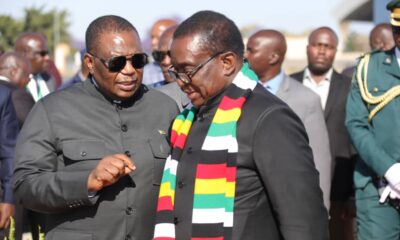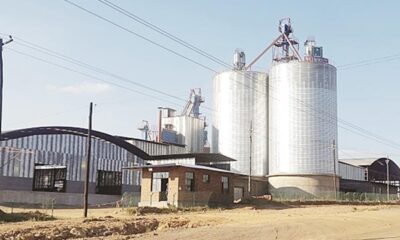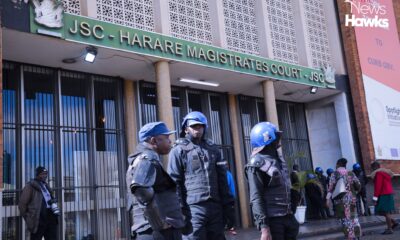
News
Rwanda military influence in Sadc grows bigger as Zimbabwe fades
Published
2 years agoon
By
NewsHawksTHE military efficiency of the Southern African Development Community (Sadc) intervention force deployed in Mozambique’s northern province of Cabo Delgado to fight Islamic insurgents has come under scrutiny as the Rwanda Security Force (RSF) shows good organisation and more capability than the regional outfit.
KELVIN JAKACHIRA RECENTLY IN CABO DELGADO
The Sadc Mission in Mozambique (Samim) was deployed on 15 July 2021 following approval by the extraordinary Sadc summit of heads of state and government held in Maputo, Mozambique, on 23 June 2021.
Samim comprises troops deployment from eight personnel contributing countries from Sadc namely, Angola, Botswana, Democratic Republic of Congo, Lesotho, Malawi, South Africa, Tanzania and Zambia, working in collaboration with Mozambican forces and other troops deployed to Cabo Delgado to combat acts of terrorism and violent extremism.

Zimbabwe, which used to be a major regional force and a keen peacekeeping participant, is not on Samim.
However, there have been reports it has sent some special forces below the radar. Government has not come out clean on this issue. Zimbabwe has previously provided security forces, including military and police, to Mozambique, Angola, Somalia, East Timor, Sierra Leone, Kosovo, Liberia, Sudan, South Sudan, Abyei and Darfur.
At least 1 400 police officers who have been deployed to United Nations peacekeeping operations since its inception. It fought in the Democratic Republic of Congo (DRC) from 1998 to 2002.
Now it is not able to send forces for combat as it did in Mozambique in the 1980s and DRC in the 1990s. So it is conspicuous by its absence or irrelevance in Mozambique.
The RSF was deployed in Cabo Delgado province in July 2021, a week after Samim moved in. The insurgents, known as Ansar al Sunnah wal Jama’a, were quickly dislodged from zones that they had captured from the Mozambican security forces following the deployment of RSF.
The RSF, which comprises forces from the Rwanda Defence Forces (RDF) and the Rwanda National Police, launched a blistering operation against terrorists immediately after its deployment.
A recent visit to Cabo Delgado by The NewsHawks confirmed reports of an efficient and sweeping military campaign by the RSF, while Samim labours on slowly.
Locals said the Rwandans were more organised and efficient compared to the Mozambican and Samim forces.
“Sadc forces are not effective as the terrorists are regrouping in Catupa Forest,” said one Mozambican journalist, who has covered the insurgency, adding: “Sadc forces are slow, Mozambican soldiers are weak and slow. By comparison, the Rwandans are efficient and swift in their operations against insurgents.”
The jihadist terrorists had set up their headquarters in Cabo Delgado’s provincial capital, the port city of Mocimba da Praia, where they were killing civilians and security personnel in some cases using crass methods such as beheadings.
There are reports suggesting the terrorists are active and gaining confidence in SAMIM’s areas of operation, launching coordinated attacks on highways and even seizing strategic territory on the Macomia district coast.

Despite escalating violence, in its areas of responsibility, SAMIM is set to end in July.
Last week, the Islamic State militants reportedly set up barricades on a main highway known as N380 between Macomia and Quissanga, in a village called Nangororo where they temporarily blocked traffic on this key road.
Macomia and Quissanga are under SAMIM’s areas of operation. According to reports, this is not the first time that the insurgents have set up barricades on the N380 as a similar incident took place last week in Mecufi on the R760 road, 2km from Mecufi headquarters.
In both cases it seems that the insurgents only wanted to steal money, food and even cigarettes from the passengers, as there were no reports of deaths or kidnappings.
In addition, a few days ago the terrorists strangely moved more than 200km from Macomia to Mecufi in just a few days surprising observers who are questioning how they were able to cover such a long distance in a short period.
On Sunday, the insurgents reportedly beheaded two civilians in Metuge district, less than 30km from Cabo Delgado’s capital city Pemba.
The Islamic State insurgents claimed responsibility for the killing of one of the victim. Many people were feared kidnapped.
On Tuesday, the insurgents killed at least two Mozambican soldiers in an ambush around the village of Nahavara in the Mecufi district of Cabo Delgado province, approximately 20km from the provincial capital Pemba.
Before the ambush, insurgents also attacked the nearby village of Makwaya, kidnapping several civilians and burning homes.
According to a Mozambican media house, Zitamar News, following the attacks, almost 100 people in the area fled to the coastal villages of Natuco and Sembenes in MecufiTHE efficacy of the Sadc intervention force deployed in Mozambique’s northern province of Cabo Delgado has come under the spotlight amid reports remnants of the jihadist insurgency are active in areas under its areas of operation and launching deadly attacks on military and civilian targets.
The insurgents, known as Ansar al Sunnah wal Jama’a, were dislodged from areas deployment of the Rwanda Security Forces (RSF) and the Sadc force in July 202The RSF, which comprises forces from the Rwanda Defence Forces and the Rwanda National Police, launched a blistering operation against the terrorists immediately after its deployment in Cabo Delgado province.
The jihadist terrorists had set up their headquarters in Cabo Delgado’s provincial capital, the port city of Mocimba da Praia where they were killing civilians and security personnel in some cases using crass methods such as beheadings.
The insurgents seized Cabo Delgado province and declared independence, naming the captured territory the Islamic Central Africa Province.
The terrorists brutalised the population in the captured territory where they killed over 6 000 civilians and displaced some 850 000, including 400 000 children. Initially, when the militants overran territory in Cabo Delgado, they were welcome and embraced by local populations who feel marginalised by the central government in Maputo.
The local populations initially saw this as independence from a corrupt and aloof government from the newfound gas reserves.
But the brutality and the devastation unleashed by the Ansar al Sunnah wal Jama’a militants undermined any professed concern for fellow Mozambicans as a result they lost any form of support from the civilian population in the captured territory.
Then entered the RSF on 21 July 2021, a week after the deployment of Samim following a bilateral agreement between Kigali and Maputo.
The RSF’s areas of operation were Mocimba da Praia, Palma and Ancuabe.
Soon after arrival, the Rwanda crack force launched a blistering military operation which routed and dislodged the terrorists from Mocimba da Praia, Palma and Ancuabe.
After being dislodged from these areas, the remnants of the terrorist group, coalesced in Macomia District, which is under the Samim’s area of operation and are hiding in an area called Caputa Forest where they are now emerging from to carry out sporadic, but deadly attacks.
These remnants are now believed to be numbering around between 200 and 250. Mozambique Defence Forces Commander Major General Tiago Alberto Nampele told reporters in Mocimboa da Praia in December when The NewsHawks was in the area that they would soon launch an offensive to rid the area of any insurgents.
“What we are planning to do is how we can begin an offensive attack and at this time we have elaborated a plan with Rwanda forces,” Major-Genenral Nampele said.
“We are actually informed that the enemy is located in the forests of Catupa where they are in small groups.”
Meanwhile, the jihadist militants are launching sporadic attacks from the forests of Catupa and have reportedly killed more than a dozen soldiers from the Mozambican army and from the Samim. The Islamic State terrorist group claimed responsibility for the attack on 31 December, in zambican army and from Samim. It was the third attack of its kind during then month.
On 29 December, the terrorist group claimed responsibility for an attack in which it said nine Mozambican soldiers were killed. Earlier, on 9 December, the jihadists claimed responsibility for an attack in which five Mozambican soldiers died. The jihadist militants also claimed to have beheaded a Christian civilian.
All these attacks were in Macomia District, patrolled by the Sadc forces. The Angolan Armed Forces deployed 20 personnel and an Ilyushin Il-76 transport aircraft to the mission, while Botswana Defence Force deployed 296 personnel to the mission in July 2021.
Lesotho Defence Forcer eportedly deployed 125 troops to the mission and Tanzania People’s Defence Force deployed 274 troops to the mission with the South African National Defence Force having committed a force strength of 1 495 troops comprising personnel and assets from the South African Air Force South African Navy, South African Army, South African Military Health Service and South African Special Forces.
Later, the Namibian Defence Force deployed a contingent of eight officers in March 2022. The Mozambican government was criticised for initially downplaying the threat and delaying Sadc intervention.
Faced with the weakness of its army, Mozambique tried to secure external support. Maputo hired several private military companies.
Russian mercenaries linked to the Wagner Group arrived in Mozambique in September 2019, but could not stabilize Cabo Delgado. Later, a South African private security company, the Dyck Advisory Group, also failed to put an end to the violence.
Maputo initially turned to private security firm the Russian-based Wagner Group in September 2019, but it failed to subdue the terrorists and withdrew after three months.
The Wagner Group reportedly lost men and equipment prompting its withdrawal. Maputo then turned to another mercenary group, the Dyck Advisory Group, based in South Africa, to combat the insurgents.
However, the Dyck group failed to reverse the tide of the insurgency resulting in its withdrawal. While the Mozambican government was late in recognising the danger of the growing insurgency, Sadc was also slow to coalesce due to frictions among its members.
Latest reports suggest terrorists are active and gaining confidence in the Samim’s areas of operation, launching coordinated attacks on highways and even seizing strategic territory on the Macomia district coast.
Despite escalating violence, in its areas of responsibility, Samim is set to end in July. Last week, the Islamic State militants reportedly set up barricades on a main highway known as N380 between Macomia and Quissanga, in a village called Nangororo where they temporarily blocked traffic on this key road.
Macomia and Quissanga are under the Samim’s areas of operation. According to reports, this is not the first time that the insurgents have set up barricades on the N380 as a similar incident took place last week in Mecufi on the R760, 2 km from Mecufi headquarters.
In both cases it seems that the insurgents only wanted to steal money, food and even cigarettes from the passengers, as there were no reports of deaths or kidnappings.
In addition, a few days ago the terrorists strangely moved more than 200km from Macomia to Mecufi in just a few days, surprising observers who are questioning how they were able to cover such a long distance in a short period.
This past Sunday, the insurgents reportedly beheaded two civilians in Metuge district, less than 30km from Cabo Delgado’s capital city Pemba.
The Islamic State insurgents claimed responsibility for the killing of one of the victim. Many people were feared kidnapped.
On Tuesday, the insurgents killed at least two Mozambican soldiers in an ambush around the village of Nahavara in the Mecufi district of Cabo Delgado province, approximately 20km from the provincial capital Pemba.
Before the ambush, insurgents also attacked the nearby village of Makwaya, kidnapping several civilians and burning homes. According to a Mozambican media house, Zitamar News, following the attacks, almost 100 people in the area fled to the coastal villages of Natuco and Sembenes in Mecufi.
The attacks took place less than 10km from the two vital highways that connect Pemba to the inland mining areas in the west and Nampula province in the south.
Groups of insurgents have been moving south from Macomia district since 19 January. Samim’s record has been run-of-the-mill.
From the start, the mission was plagued by funding shortages and tensions with Mozambican forces, who have accused Samim of lacking initiative and failing to take the fight to the enemy.
Analysts are querying that given the capture of the Macomia coastline, which Sadc troops were responsible for defending, this mission has hardly been fulfilled.
Indeed, the start of the drawdown may have been partly responsible for making the capture of the coastline possible in the first place.
Reports say despite Samim’s imminent departure; it has not yet provided an assessment of its impact.
While Samim is struggling, Rwanda has indicated that it could expand its own mission and take on some of the security burden.
The RDF recently staged military operations against insurgents in Mozambique and the Central African Republic (CAR). Both actions were performed outside regional or multinational efforts. This makes the contemporary actions of Rwanda outliers in the international relations of Sub-Saharan Africa and heralds shifts in conflict management on the continent, according to a research by Brendon J. Cannon & Federico Donelli.
“Rwanda is manoeuvring — a first — as the country’s leaders have taken advantage of a permissive strategic environment, high clarity, leaders’ beliefs and a strategic culture to produce the output of extra-regional military deployments,” the research says.
“When elements of RDF swept into Cabo Delgado in mid-2021 to combat a violent Islamist insurgency, both regional and international observers were surprised. That a small state in East Africa’s Great Lakes region would deploy its military into the heart of Southern Africa — let alone be invited to do so — had no historical precedent.
“In the space of a few months, the RDF brought the situation in Cabo Delgado under control, agreed to train contingents of the Mozambican military and saw their deployment extended. “Their intervention in Mozambique followed similar missions in the CAR, a country over 3000km away from Mozambique and nearly half that distance from Rwanda.
“In CAR, Rwandan troops made headway against a variety of anti-government insurgents as part of a United Nations (UN)-sanctioned mission. “In December 2020, more RDF troops were invited — based on a bilateral agreement between the leaders of Rwanda and CAR — to operate outside the UN’s mandate.”
It says RDF’s deployments and operations represent significant outliers in the international relations of Sub-Saharan African states.
These states’ militaries have, since independence, exhibited little appetite for either bilateral deployments or for operations in states outside their geographic region. Rwanda’s actions signal a significant rupture with the past six decades as its leader, President Paul Kagame, seeks to identify himself and project his country — through word and deed — as an African security provider in Sub-Saharan Africa.
“This theory-driven research aims to understand Rwanda’s foreign policy behaviour. Specifically, we seek to explain why Rwanda’s approach to African crises has recently changed by implementing a policy agenda based on military deployments to states far removed from Rwanda and its Great Lakes region,” it adds.
“In short, Rwanda’s palpable foreign policy shifts — the why, when and under what conditions it decided to promote regional security bilaterally rather than multilaterally — require explanation.
“In this actor-specific study, we employ neoclassical realist theory to identify and analyse the processes, outputs and effects of Rwanda’s current foreign policy behaviour on the African continent, highlighting the important role of one individual, Kagame, and one institution, the RDF, in the process.
“Neoclassical realism’s emphasis on the international system and the nature of the strategic environment open the door for an exploration of how this small, landlocked, densely populated and resource-poor state came to possess one of Africa’s most capable militaries, but also why its deployments extra-regionally became a reality.
“We have selected the case of Rwanda because its recent foreign policy actions set it apart from all other Sub-Saharan African states. Rwanda’s extra-regional military deployments — based on bilateral agreements with host states — offer a clear variable to test.”
The study adds: “Thus, Kigali’s decision to deploy extra units of the RDF to CAR should be understood as complementary but separate from its multilateral engagement in the country. Rwanda’s military presence in CAR rapidly increased with the deployment of several RDF units — mainly to the CAR-Cameroon border to ensure supply lines from the west to Bangui.
Concurrently, relations between the two states improved, with Kagame providing military troops as well as training to reform CAR’s security and defence sectors.
The country’s President, Faustin-Archange Touadéra, offered concessions to Rwandan firms in CAR’s mining sector. Soon after, Rwandair, Rwanda’s national airline, began to fly between Kigali and Bangui.
The second extra-regional RDF intervention began in Mozambique. This had no precedent in terms of either a multilateral or regional mission.
The catalyst was Nyusi’s secret visit to Kigali in late April 2021. Kagame reportedly responded to Nyusi’s personal request for an RDF deployment with alacrity by first sending small RDF contingents for intelligence, reconnaissance and surveillance, and then deploying upwards of 1000 troops by early July.
Like Nyusi’s visit to Kigali, the RDF’s actions were initially shrouded in secrecy on account of the sensitivity of the situation. Nyusi and his ruling cadre were asking Kagame for nothing less than armed action against the Islamist group Ahlu Sunnah Wal Jamaah (ASWJ) in Mozambique’s northern Cabo Delgado province.
ASWJ had operated with growing impunity since 2016, and, in March 2021, the group overran the small coastal town of Palma, killing dozens of people, and sent hundreds of expatriates, working on what were to be highly lucrative offshore gas exploitation projects, on the run.
Previous efforts to quell the insurgency by the Mozambican military, the South African private military contractor Dyck Advisory Group and the Wagner Group – a Russian mercenary outfit with ties to the Kremlin – had all ended in humiliation at the hand of ASWJ.
The Islamist rebels’ advance and their siege of Palma effectively marked the cessation of efforts by major hydrocarbon companies to export Mozambique’s significant gas reserves.
They left behind a US$20 billion liquefied natural gas project operated by French petrochemical giant TotalEnergies.
This caught the attention of external states like France and the United States as well as regional entities, including Sadc.
You may like




















